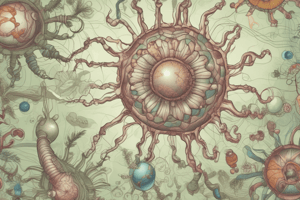Podcast
Questions and Answers
What does the study of Botany focus on?
What does the study of Botany focus on?
- The study of animals
- The study of plants (correct)
- The study of genetic variations
- The study of microorganisms
Which of the following is considered the basic structural and functional unit of life?
Which of the following is considered the basic structural and functional unit of life?
- Cell (correct)
- Tissue
- Organism
- Organ
Which branch of biology investigates the interactions between organisms and their environment?
Which branch of biology investigates the interactions between organisms and their environment?
- Zoology
- Ecology (correct)
- Genetics
- Biochemistry
What are proteins primarily known for in biological systems?
What are proteins primarily known for in biological systems?
Which level of biological organization is made up of a group of similar cells performing a specific function?
Which level of biological organization is made up of a group of similar cells performing a specific function?
Which molecule is primarily responsible for energy storage in living organisms?
Which molecule is primarily responsible for energy storage in living organisms?
Flashcards are hidden until you start studying
Study Notes
What is Biology?
- Biology is the scientific study of life and living organisms
- It encompasses the structure, function, growth, evolution, distribution, and taxonomy of all living things
Branches of Biology
- Botany: study of plants
- Zoology: study of animals
- Microbiology: study of microorganisms
- Ecology: study of interactions between organisms and their environment
- Genetics: study of heredity and variation
- Biochemistry: study of chemical processes in living things
- Molecular Biology: study of biological molecules and their interactions
- Cell Biology: study of cell structure, function, and behavior
Levels of Organization
- Molecule: basic building blocks of life (e.g. DNA, proteins)
- Organelle: specialized structures within cells (e.g. mitochondria, chloroplasts)
- Cell: basic structural and functional unit of life
- Tissue: group of similar cells performing a specific function
- Organ: structure composed of two or more types of tissues
- Organ System: group of organs working together to perform a specific function
- Organism: individual living thing (e.g. plant, animal, fungus)
Biological Molecules
- Carbohydrates: energy storage molecules (e.g. glucose, starch)
- Proteins: molecules performing a wide range of functions (e.g. enzymes, structural proteins)
- Lipids: molecules involved in energy storage and cell membrane structure (e.g. fats, oils)
- Nucleic Acids: molecules containing genetic information (e.g. DNA, RNA)
Cell Processes
- Metabolism: conversion of energy and nutrients
- Photosynthesis: process by which plants convert light energy into chemical energy
- Cellular Respiration: process by which cells generate energy from glucose
- DNA Replication: process by which cells duplicate their genetic material
- Gene Expression: process by which cells translate genetic information into proteins
Evolution
- Theory of Evolution: process by which species change over time through natural selection
- Natural Selection: mechanism driving evolution, favoring individuals with advantageous traits
- Speciation: process by which a new species emerges from an existing one
- Phylogeny: study of evolutionary relationships between organisms
What is Biology?
- Scientific discipline focused on life and living organisms.
- Examines structure, function, growth, evolution, distribution, and taxonomy of all life forms.
Branches of Biology
- Botany: Studies all aspects of plants.
- Zoology: Focuses on the biology of animals.
- Microbiology: Investigates microorganisms including bacteria and viruses.
- Ecology: Analyzes interactions between living beings and their environment.
- Genetics: Explores heredity and genetic variation among organisms.
- Biochemistry: Examines chemical processes that occur within living entities.
- Molecular Biology: Studies biological molecules and their interactions at a molecular level.
- Cell Biology: Investigates cell structure, function, and behavior.
Levels of Organization
- Molecule: Fundamental building blocks of life, examples include DNA and proteins.
- Organelle: Distinct structures within cells, like mitochondria for energy production and chloroplasts for photosynthesis.
- Cell: The basic unit of life, fulfilling both structural and functional roles.
- Tissue: A collection of similar cells performing a common function.
- Organ: Comprised of two or more tissue types working together.
- Organ System: Integrated group of organs that performs complex functions.
- Organism: An individual living entity, such as a plant, animal, or fungus.
Biological Molecules
- Carbohydrates: Serve as energy storage and include molecules like glucose and starch.
- Proteins: Function across various roles including enzymes that catalyze reactions and structural components.
- Lipids: Play crucial roles in energy storage and forming cell membranes, examples are fats and oils.
- Nucleic Acids: Store and transmit genetic information, notably DNA and RNA.
Cell Processes
- Metabolism: Involves the chemical processes for energy conversion and nutrient utilization.
- Photosynthesis: Enables plants to convert light energy into chemically stored energy.
- Cellular Respiration: The method cells use to generate energy from glucose breakdown.
- DNA Replication: Process allowing cells to accurately duplicate their genetic hereditary material.
- Gene Expression: The conversion of genetic information into functional proteins.
Evolution
- Theory of Evolution: Explains how species evolve through natural selection mechanisms.
- Natural Selection: Drives evolutionary changes by favoring traits that enhance survival and reproduction.
- Speciation: The evolutionary process leading to the formation of new species from existing ones.
- Phylogeny: Studies the evolutionary histories and relationships of different organisms.
Studying That Suits You
Use AI to generate personalized quizzes and flashcards to suit your learning preferences.




